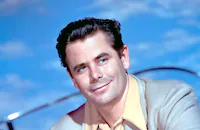The Mating of Millie

Brief Synopsis
Cast & Crew
Henry Levin
Glenn Ford
Evelyn Keyes
Ron Randell
Willard Parker
Jimmy Hunt
Film Details
Technical Specs

Synopsis
Having just been reprimanded by his boss for being impolite to his passengers, bus driver and part-time author Doug Andrews takes to his route with greater restraint on his temper. Not long into his route, however, Doug completely loses his self-control and abandons his bus, leaving his passengers stranded. One of the passengers, department store personnel director Millie McGonigle, is impressed with Doug's hard-headedness and offers him a job at her store. Later, when she returns to her apartment complex, Millie finds herself babysitting her next-door-neighbor's young son, Tommy Bassett, whose mother has left him unattended for the night. Millie rescues the crying Tommy with the help of her dashing playboy neighbor Phil Gowan, who pulls Tommy out through the window of his apartment. The next day, Millie learns that Tommy's mother died in an automobile accident and that Tommy has been placed in a foundling home. Millie is opposed to Tommy's placement in the institution and asks the overseer, Ralph Galloway, for permission to adopt the boy. Galloway grants Millie an adoption interview but Millie is caught off-guard by his question that assumes she has a husband. Millie, who is single, realizes that she cannot provide Galloway with a satisfactory answer, so she lies to him, telling him that her husband cannot be contacted because he is in Alaska. Galloway remains firm in his insistence that Millie's husband be interviewed and tells her that she must arrange for his interview within sixty days, the length of the waiting period in which Tommy is required to remain in the state's custody. Desperate to find a husband in short order, Millie returns to her office and searches through her files for eligible bachelors. When Doug enters her office and mentions that he once lived in Alaska, Millie believes that she has found her instant groom. Despite her best attempts to coax him, though, Millie soon realizes that Doug, a self-avowed life-long bachelor, will never marry her. Instead, Doug offers to help her find a husband and begins instructing her on how to be more alluring. The lessons have an immediate effect, as Millie succeeds in catching Phil's eye. Doug, however, disapproves of Phil and prefers that Millie pursue Ralph, who soon learns that Millie had been lying about having a husband. When the end of the sixty-day waiting period arrives, Ralph proposes to Millie, but she refuses. Although she has fallen in love with Doug, Millie is still certain that he will never marry her, so she announces her intention to marry Phil. She eventually realizes that she cannot go through with the ruse, though, and turns down Phil's proposal. Returning defeated to the orphanage, Millie tells Ralph that she is giving up her attempt to adopt Tommy. Ralph only adds to Millie's misery when he tells her that Tommy was adopted one hour before she arrived. Heartbroken, Millie returns to her apartment and finds Doug there waiting for her. After they kiss, Doug presents Millie with a surprise--her newly adopted son Tommy.

Director

Henry Levin
Cast

Glenn Ford

Evelyn Keyes

Ron Randell

Willard Parker
Jimmy Hunt
Mabel Paige
Virginia Hunter
Virginia Brissac
Patsy Creighton
Tom Stevenson
Gay Nelson
Hal K. Dawson
Trevor Bardette
Irene Tedrow
Isabel Withers
Dick Wessel
Victoria Horne

Russell Hicks
Rita Gould

Ray Teal
Mary Mcleod
Mary Jo Ellis
Wanda Perry
Mary Emery
Marquita Olsen
Forrest Dickson
Mabel Smaney
Ottola Nesmith
Jack Overman
Sally Corner
Bert Hanlon
Alphonse Martell
Nancy Saunders
Douglas D. Coppin

Jean Willes
Mary Newton
Helen Mowery

Donald Gordon
Kathleen O'malley
Crew
Fayte Browne
Don Christie
Sidney Clifford
Adele Comandini
George Cooper
Richard Fantl
Milton Feldman
Stephen Goossón
Harold Hanks
Werner R. Heymann
Walter Holscher
Helen Hunt
Newt Jones
Rose Loewinger
Jean Louis
Louella Macfarlane
St. Clair Mckelway
Wilbur Menefee
Casey Robinson
M. W. Stoloff
Joseph Walker

Videos
Movie Clip



Film Details
Technical Specs

Articles
The Mating of Millie -
By Violet LeVoit

The Mating of Millie -
Quotes
Trivia
Notes
The working title for this film was The Mating of Millie McGonigle. According to a June 1948 Hollywood Reporter news item, Columbia paid $50,000 for the film rights to Adele Comandini's original story, and initially assigned Frances Manson to produce it. Glenn Ford and Evelyn Keyes reprised their roles in a Lux Radio Theatre broadcast on January 3, 1949.














